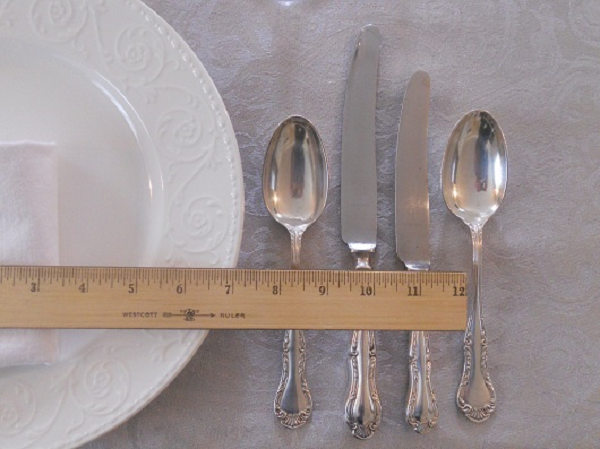I am sure that you have heard of the TV series “Downton Abbey.” If you haven’t, I won’t take the time to explain it all to you. Among the many interesting things about the series is how much care is taken to hold elaborate dinner parties. The servants took great care to make sure that everything was done precisely. They even measured how far the fork, knife and spoon was spaced from the plate. They used a ruler and checked every setting. The invited guests were appropriately dressed and each one was assigned a place to sit. During the dinner, there were rules of etiquette that were rarely broken. Those who broke these rules would either be highly embarrassed or later shunned as being boorish.
There have only been a few times when I have been invited to a party that required correct conduct. One stands out in my memory. Mrs. Woods was my English teacher. She was strict but she seemed more interested in talking about Emily Post and proper manners than teaching English. Towards the end of the semester, she surprised us with the news that we would practice our manners at a dinner at a fine local restaurant. We were to dress up and we would be assigned a place at the table. She arranged for each boy to sit next to a girl and while that alone was enough to scare me to death, the fact that I had to act like a gentleman with proper manners created a lot of anxiety. By the way, the evening went very well and being a perfect gentleman, I made a passing grade for the semester.
Jesus spoke of proper etiquette. Suppose you were invited to wedding banquet. If no seats had been assigned, where do you sit? Now, its human nature to consider your relationship to the host. If you were a family member or a close friend, you’d expect to sit close to the wedding party. So, you take what you consider to be a seat. Imagine your shame when the host asked that you sit farther away. No, Jesus says, it is better to sit far back so that when the host sees you, he will call you forward.
Jesus was invited to dinner and he saw the Pharisees taking the best rooms and the best seats. So, the Master told this parable and summed it up: “For whosoever exalts himself shall be abased; and he that humbles himself shall be exalted.” (Or if you put yourself above others, you will be put down) I don’t think Jesus would be invited to many Hollywood parties, do you?
We generally don’t think of ourselves as exalted or above others. We will never be invited to Downton Abbey, and we will never be called to dine with kings or presidents. The parties I attend have no rules of etiquette or dress. Everything has become very informal and casual. Of course, we do take pride in our possessions and our accomplishments. So, what does this parable mean to me?
The Lord explained that the issue is humility and pride. These two things will determine where we sit in the Great Banquet. Let me give a few examples of the balance between humility and pride.
Even though the Bible says that my answer should just be “yes or no,” I dare not make a commitment. After all, I may have more important things to do that day. Even if you send out an invitation and include a stamped return envelope for an RSVP, many people will not respond. Even though they could say no, they want to hedge their bets. Maybe there won’t be anything else better to do that day and it would be shame to miss a good party. How does one plan to cater such a lack of commitment? Well, isn’t this exalting needs over others? No humility here.
Consider the “plastic fuzzy.” Someone says, “Let’s get together for dinner.” The right response: “I would love to…when?; or “I’m sorry but I can’t.” The plastic fuzzy response?- “Well, I’d love to just as soon as I finish some work and get my life in order and take care of the grandchildren and…etc..etc.” I give you a plastic fuzzy because my needs are above you. No humility here.
The same plastic fuzzy lack of commitment can affect our relationship to God. I know I should read the Bible, study, fast, pray, attend Church, contribute my money and do good works. I promise I will..I will..just as soon as I get my life in order, pay off my debts, stop smoking, get up earlier, go to bed later, the children get older, my life gets less complicated, etc. Again, I must give a plastic fuzzy response because my needs are exalted above my commitment to God. No humility here.
Would such waffling work at a wedding? When asked before witnesses if it is your intent to wed, you respond with a plastic fuzzy response: Well, I will marry if my spouse behaves, doesn’t spend my money, is affectionate when I need it, cooks all my meals and cleans the house, etc. If he/she will do all of that, then I will make a complete commitment. Of course, this is how many live today as couples. Before we make a commitment, let’s see how it goes. In other words, my needs are exalted above my commitment. No humility here.
I exalt myself when I laugh at the appearance or failings of others, fail to visit a sick friend, refuse to forgive someone for their mistakes or offense against me, fail to give to the poor, or fail to make a commitment to the Church, the Body of Christ. These are but a few examples of how we exalt our needs above the needs of others, even above God.
If it is true that pride goes before a fall, then in this life we can look forward to being put down. I know I have been put down many times and my exalted dreams crashed to the ground. Thank God for it, but it was always painful. I hope that I have learned greater humility. If not, of this I am sure -when I come to the Great Banquet, I will be asked to sit in the cheap seats far from the Host.

















